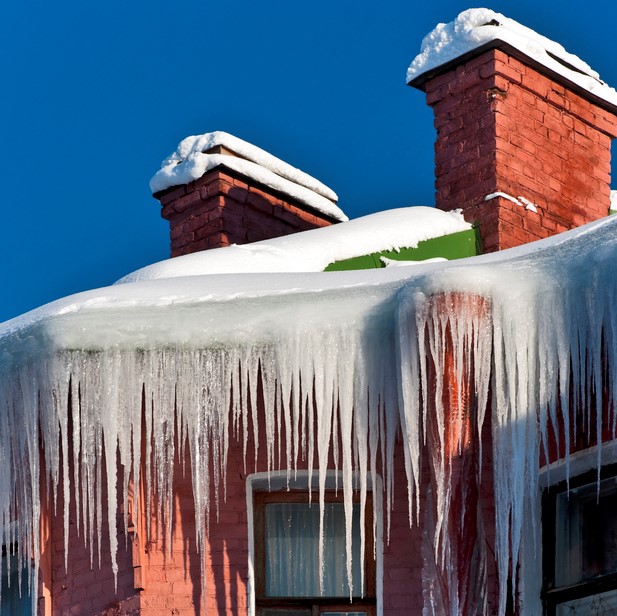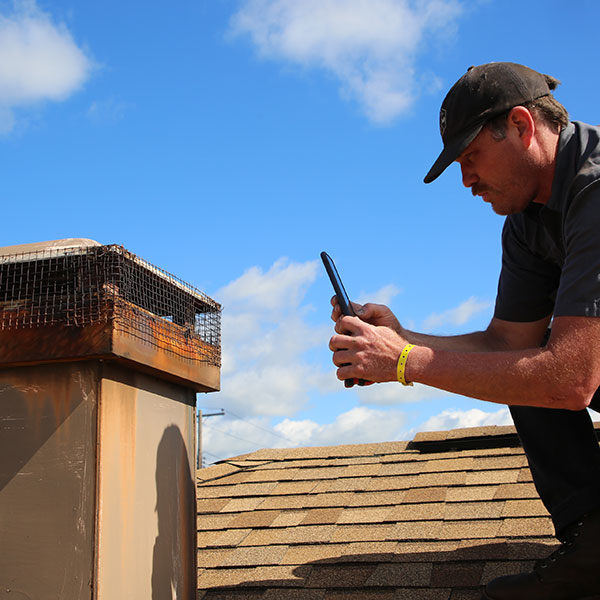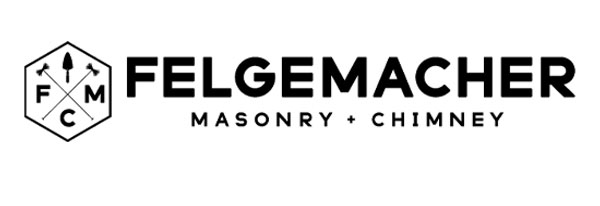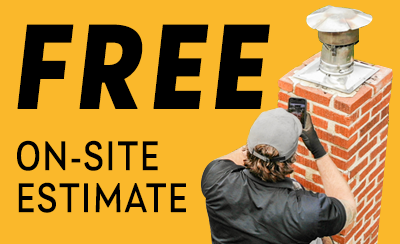How Ice Dams Can Damage Chimneys
One thing we can count on during our New York winters is plenty of snow. We also can count on that snow melting and then refreezing. When this happens in recessed areas of your roof where your chimney sits, ice dams are formed and can eventually cause damage to the chimney’s masonry and flashing.

Masonry is vulnerable to water intrusion
Any water or ice (i.e., moisture) that’s allowed to be in contact for long periods with the masonry of your chimney can pose a problem. Water can easily get into the surfaces of porous bricks and small cracks in both bricks and the mortar that holds the bricks together.
Once inside, the water will freeze and expand when the temperature drops. After a few cycles of this, small compromises in the masonry become larger compromises, and more melting ice from the ice dam can enter the system.
Ice dams and chimney flashing
The flashing that skirts the perimeter of your chimney where it meets the roof is also negatively affected by standing ice.
Flashing material can warp and rust, which may open the gap allowing water to run into your home.
Incoming water through damaged flashing can lead to deterioration of attic materials and other materials within your home as well as the growth of dangerous mold. Dark, closed and damp areas are ideal for harboring mold, which often isn’t known until a serious infestation occurs.
Some chimneys aren’t affected by ice dams, but . . .
Chimneys that extend through high points on roofs generally aren’t subject to accumulating snow and ice, because the melting water just runs down toward lower roof points.
However, all chimneys can be harmed over time by rain and snow, particularly if the masonry already has cracks in it. Bricks and mortar can suffer damage for various reasons including:
- Lightning strikes
- Pounding hail storms
- House-settling
- Problems with the chimney footing
- Earthquakes
- Chimney fires
- Season after season of intensely hot and cold weather
Safeguarding your chimney
You can remove ice dams periodically, and you can keep tree debris from building up around your chimney to prevent water, snow and ice from accumulating against the masonry. You can’t, however, keep moisture from being created by nature. Fortunately, there are some ways to safeguard your chimney from the potentially calamitous effects of water damage.
Chimney waterproofing: If damage to the masonry is minimal (i.e., small cracks), a professionally applied water sealant can prevent water from getting into open spaces.
Brick repair: Damaged bricks are clear invitations for water intrusion. As more water seeps in, further damage (“spalling”) will occur. Having damaged bricks repaired or replaced puts an end to the cycle.
Tuckpointing: This is a process whereby fresh, new mortar is added to areas where old mortar is deteriorating, thus strengthening the entire masonry system.
Chimney rebuilding: When large areas of your chimney’s masonry are affected, partial or complete chimney rebuilding will restore strength and fight off further water intrusion.
Have your chimney inspected

Annual chimney inspections are an excellent way to stay on top of minor chimney damage from the elements and get repairs done early, before they become complicated and expensive.
When winter is over, an inspection can determine if ice dams have caused problems for your chimney’s masonry or flashing. Your inspector also can evaluate all areas of the masonry as well as the chimney cap, chimney crown, chimney liner, fireplace damper and other components and quickly schedule any necessary repair work.
Felgemacher Masonry & Chimney has served the Buffalo and Rochester, NY, regions since 1953 with expert chimney repair, inspections and chimney sweep services. If you need help with ice-dam damage or any other issues, let us help you with a solution. Speak with a chimney professional at (716) 907-4914.





